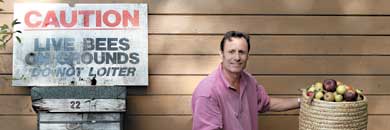The saviour of the English apple
James Hamill created an orchard to feed his bees. Little did he know, says Victoria Brown, that he would also help the humble apple

Some people might know James Hamill as the owner of the famous Hive Honey shop in London. It sells everything and anything bee-related - over 700 different products in fact. Walk in at any time and chances are you'll be greeted with Dickensian scenes of Hamill, behind the counter, concocting hayfever cures from pollen or making up a batch of beeswax lip balm. Fewer people know, however, that in his efforts to keep his bees well-fed and happy, Hamill has, almost as a by-product, built up one of the country's most extensive and precious apple orchards.
Hamill is clearly a man who doesn't do things by halves. "I bought a piece of derelict land in Surrey 11 years ago because I needed somewhere for the bees to eat," he says, "apple trees seemed ideal." Bee Heaven Farm is now home to 76 varieties of apple, which Hamill is in the process of harvesting with the help of friends and locals. Impressively, he can talk with authority on each and every fruit.
It didn't take Hamill long to get serious about his new pet subject. "I quickly discovered that there is a huge number of English apples - fantastic varieties that are now lost - many with such romantic stories behind them. In this country apples were once a prized delicacy, now we get a choice of three that have been flown in from New Zealand or wherever. I discovered that the Government paid subsidies for farmers to destroy old orchards. It's criminal."
Many of the fruits taste nothing like the bland supermarket apples we now know. Hamill describes varieties that taste of peach, lemon, cinnamon and even pineapple. "The pitmaster's pineapple is about the size of a toddler's fist," he says. "It's pear-shaped with a bright yellow skin, and has a subtle pineapple flavour. People are astonished when they try them." One of his favourites is the oaken pin, which looks like a plum, and tastes of nutmeg. "It got its name because it looks like the oak pin used to plug casks in the 1600s," says Hamill. One of the first types he planted was from an apple tree called the Howgate wonder. When the graft finally reached maturity, the resulting fruits, he says, were as big as the head of his three-year-old son.
Over the years, Hamill has nurtured his original selection of pencil-sized grafts to fully mature trees. Since some of his precious varieties are so prone to disease, their journey has been a true labour of love. "I spend hours searching for diseased patches," he says, "pruning them, and then covering them with a resin to prevent any further infection. It breaks my heart if anything happens to any of them. It's all too easy to spend years nurturing a single branch, only for it to break in a strong gust of wind."
The layout of the orchard is equally well thought-out. He only has two trees of each apple type, and deliberately avoided grouping together those producing the same colour of fruit. They are also arranged according to a complex system of different blossoming times, to ensure that no part of the orchard would ever be entirely bare. The effect is a startling kaleidoscope of colour.
Although Hamill did not originally intend the orchard to be a business venture, he put some apples out for sale in his honey shop when he harvested them last year, The entire lot sold out within two weeks. Having harvested a far larger crop this year, it's beginning to look like he's stumbled across a viable commercial venture. He's currently looking for a local deli or supplier who would be interested in selling his apple juice (76 varieties included).
For the moment, the orchard is flourishing but Hamill worries about the long term. "I do get concerned that once I'm gone, there may be no one to carry on my work," he says. "I'm trying to involve my children but who's to say they will want to dedicate as much of their lives to this as I have. I have nightmares about the orchard being sold to a property developer and the trees destroyed."
The Hive Honey Shop, 93 Northcote Road, London SW11, www.thehivehoneyshop.co.uk. National Apple Day is on 21 October, for more information visit www.defra.gov.uk
Join our commenting forum
Join thought-provoking conversations, follow other Independent readers and see their replies
Comments